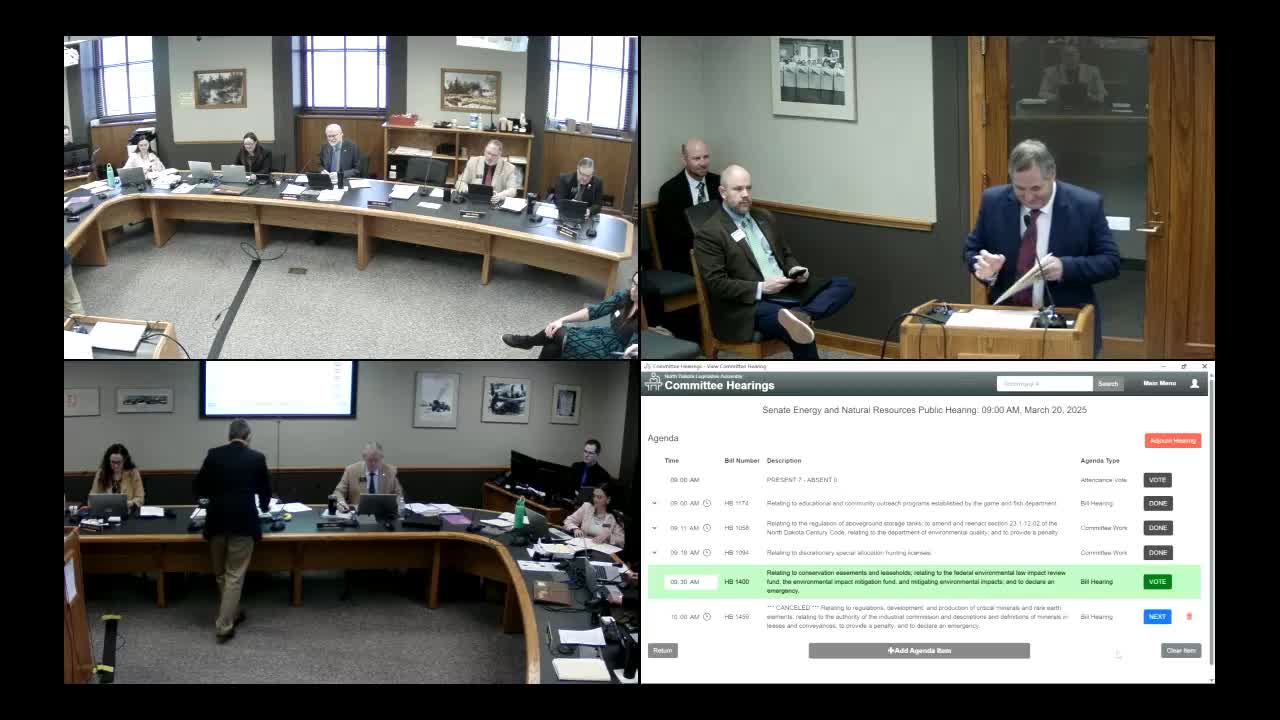Committee backs bill allowing Agriculture commissioner to hold easements and earn interest on mitigation fund
Get AI-powered insights, summaries, and transcripts
Subscribe
Summary
House Bill 1400 passed the committee after testimony that the bill will allow the state to accept developer mitigation funds, earn interest on the mitigation account, and hold easements to manage required environmental mitigation tied primarily to energy projects.
House Bill 1400, which allows the state to earn interest on the Environmental Impact Mitigation Fund and authorizes the Agriculture Commissioner to enter into easements needed to implement the mitigation program, received a due‑pass recommendation from the Senate Energy and Natural Resources Committee by a 7‑0 vote.
What the bill does: Commissioner Doug Goring testified the bill “provides the ability to acquire interest on money in the environmental impact mitigation fund and the ability to enter into easements and to carry out the intent and purpose of the mitigation program.” The statutory authority will permit the department to accept mitigation dollars from developers (for example, wind‑energy projects), deposit those funds in an interest‑bearing account (Bank of North Dakota or similar), and use the interest and principal to carry out mitigation obligations.
Mitigation approach and easements: Goring described how developers who cannot fully avoid indirect impacts to wildlife and habitat may be required to pay mitigation. The state would hold and manage easements (rather than private third parties) to ensure accountability, continuity and oversight of mitigation work. Commissioner Goring said mitigation easements would be limited to the life of the project (commonly 30 years) and that if impacts extended beyond that period the legislature or agency would need to revisit terms. He told the committee the department anticipates one full‑time equivalent (1 FTE) staff position to administer the program.
Stakeholder support and caveats: Minnkota Power Cooperative (Carly McLeod) and Basin Electric Power Cooperative (Ryan Norell) testified in support, noting the department worked with utilities to draft the program and that the bill includes clarifying language to avoid forcing unrelated facilities into the mitigation process. Committee members asked for details about easement terms, whether the state would purchase land (Goring said the developer pays for mitigation; the state would hold easements rather than purchase land), and how mitigation sites would be selected (starting near the project footprint and within the relevant landscape/watershed).
Vote and next steps: Senator Behn moved a due‑pass recommendation; the clerk recorded 7 ayes, 0 nays, 0 absent. The committee approved the bill and named a carrier. The department said interest earned on deposits would remain in the mitigation fund to support program operations and maintenance.
